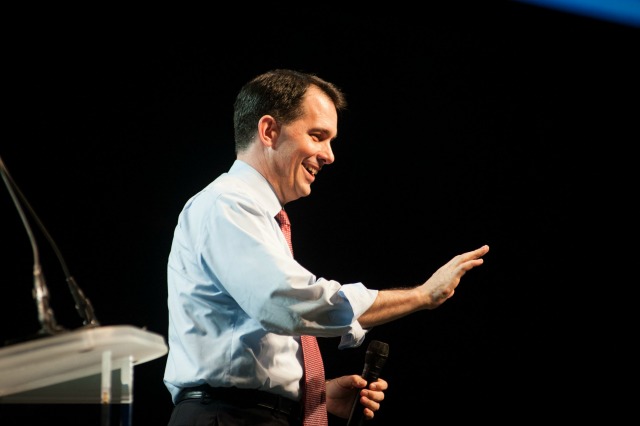Wisconsin's Economic Woes Could Dash Gov. Walker's Presidential Hopes
By aaroncynic in News on Jun 30, 2015 7:35PM
Though the clown car that is the 2016 GOP primary race has already reached stretch HumVee sized proportions, more candidates are expected to join the circus, including Wisconsin Gov. Scott Walker.
Compared to candidates like Donald Trump, Ted Cruz and Chris Christie, Walker seems like a much safer—and even rational—bet. He managed to survive a recall battle that made national headlines for weeks, secured reelection with 52.3 percent of the vote, is the top choice for the billionaire Koch brothers and tends to avoid making toxic gaffes...unlike Donald Trump.
Despite the attractive nature of running a viable candidate that comes with a built in funding source of billions, Walker could face some trouble proving that his economic policies—grand examples of pro-business anti-labor austerity measures—will be good for the country.
“He’d like to be able to say, ‘I can go to Washington and get the economy running again,’ Barry Burden, a University of Wisconsin-Madison professor, told the Milwaukee Journal Sentinel. That however, could prove more complicated than Walker and his supporters might like. According to the Chicago Tribune, forecasts of an economic surplus in Wisconsin that exceeded $1 billion have now turned to a deficit of $2.2 billion and Walker is at odds with Republicans on how to fix the problem.
Last year, Walker enacted a series of sweeping tax cuts with little to no plan on how to make up the loss in revenue, hedging his bets that the move would spur job growth. That, however, didn’t pan out, and now the soon-to-be presidential candidate has butted heads with legislators over proposed cuts to education and borrowing to fund a road construction project. “When the new projections didn't materialize, we put ourselves into a hole,” Dan Knapp, research director for the Wisconsin Taxpayers Alliance told the Tribune.
In fact, Wisconsin ranks 35th overall in job creation and came in dead last for business start up activity. Despite Walker’s attempt to snag businesses from Illinois with a billboard campaign saying that “Wisconsin is open for business,” the Wisconsin Gazette reports Illinois experienced one of the highest growth rates for start-ups in 2015, and the state still ranks slightly higher than Wisconsin for overall job growth. While the U.S. as a whole saw a 9.3 percent gain in private sector jobs, Wisconsin lagged behind at 5.7 percent, and by the end of Walker’s first term, the state still had failed to return to pre-recession employment levels.
Even still, Walker has his defenders. State Sen. Scott Fitzgerald told the Tribune he blamed a sluggish national economy. “We're still waiting for it to kick in, and I think we're better positioned to be successful when it does,” he said.
How much the facts versus reality argument when it comes to economic growth produced by Walker will actually affect his candidacy is up for grabs. Job and economic growth is only one way to measure the success of a politician in office, and with the way the majority of GOP front runners have positioned themselves on social and foreign policy issues, Walker’s economic record could seem relatively dull to voters.
Still, it’s well worth watching as the primary shakes out, especially in the light of Illinois’ own governor’s proposals mirroring many of Walker’s. A Koch brothers-backed Republican in the White House means economic policies that will most certainly give even more tax breaks to already wealthy corporations and individuals, and when the budget deficit gets bigger, poor and middle class families can be expected to shoulder the difference via cuts to social services. While Walker’s economic record might not be a deal-breaker for Americans, it’s certainly a roadmap for economic disaster for the majority of them.
